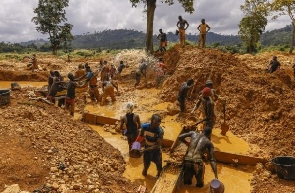A group of women, known as Women in Forestry, have expressed displeasure at the rate at which the country's natural resources are being mismanaged, leading to the destruction of water bodies and forest reserves.
The women, who registered their sentiments at a workshop in Kumasi, wondered how forest reserves, water bodies, and conservation sites, among others, have been given out directly and otherwise to be used for mining and other extractive activities, with impending dire consequences for the nation, especially those living in the immediate peripheral communities.
During the plenary session of the workshop, a member recounted how she and her mother nearly died from cyanide poisoning from cassava they bought from a different region.
"Who would fathom the possibility of me and my mother being poisoned by cassava bought from a region far away from mine? That is why we should all be concerned about illegal mining or galamsey in the country, irrespective of the location or proximity," she said.
The member said, but for a test at the Food and Drug Administration (FDA), they wouldn't have known it was cyanide used in a mining area where the cassava was cultivated, which nearly took the two to an early grave.
Other participants blamed the regulatory bodies and the security agencies for issuing licenses for mining in reserves and conservation sites and compromising with illegal miners.
They were of the view that rural poverty contributes significantly to community members' involvement in destructive illegal mining, calling on the government to initiate livelihood improvement projects in such areas.
The group indicated their willingness to join their colleagues from Women in Timber to demonstrate against the government over the issuance of licenses for mining and timber in reserves.
The workshop organized by the Rights and Advocacy Initiative Network (RAIN), in collaboration with Taylor Crabbe Initiative and Client Earth, brought together women from various spheres of the forestry and conservation industry, including civil society organizations (CSOs), academia, and the media.
Doreen Asumang-Yeboah, Director of RAIN, indicated that the workshop was meant to build the capacity of women in the industry to enable them to play their roles at various levels in the conservation of nature.
She challenged the women to be involved in activities aimed at protecting conservation sites and forests from destruction, given their relevance to human lives.
President of Women in Timber Ghana, Ernestina Owusu Banahene, informed the women of an impending demonstration to register their protest at the conversion of conservation sites into mining and timber harvesting sites.
She called on all women to join in the demonstration as part of their contribution towards conserving nature.
A legal practitioner at the Taylor Crabbe Initiative, Albert Agyepong, took participants through the new European Union Deforestation Regulation (EUDR), requiring products entering the EU market to meet certain conditions, including proof of production devoid of deforestation and child labor.
He explained that the major challenges countries such as Ghana faced were deforestation and child labor.
"It is non-negotiable. It is about what the EU wants because it is their law, and you either agree to their terms and definitions or keep your products," Mr. Agyepong stated.
The workshop also had sessions on mental health and gender-based violence.
Regional News of Monday, 20 May 2024
Source: Mawuli Viwotor, Contributor













